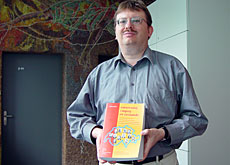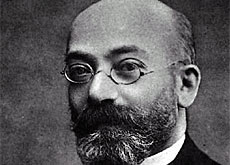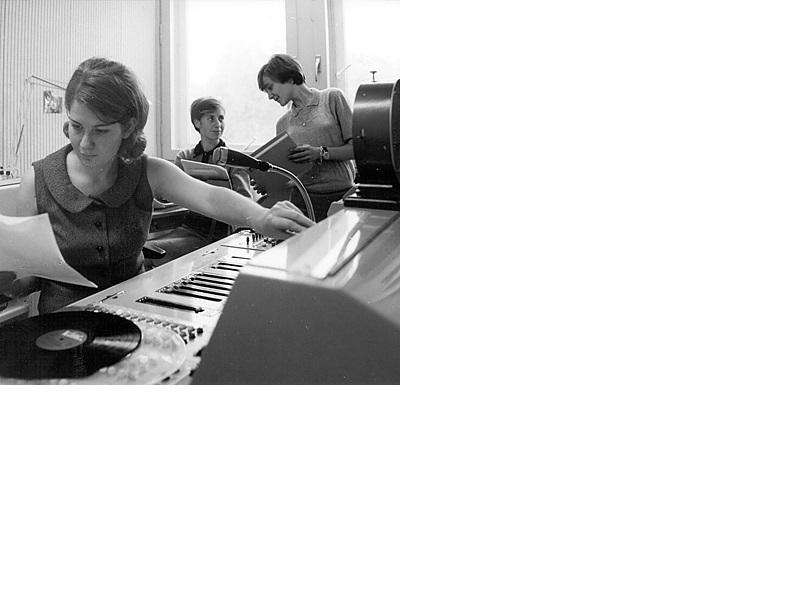When Switzerland broadcast Esperanto around Europe

From 1946 to 1992, swissinfo.ch’s predecessor also broadcast programs in Esperanto. Why were these bulletins introduced, and why were they stopped?
On February 17, 1946, the Swiss Short-wave Service, later Swiss Radio International (SRI) and ultimately swissinfo.ch, began broadcasting a weekly program within Europe in Esperanto, easily the most widely used constructed language in the world.
As an Esperanto refresher, in this archive clip from 2003 Swiss psychologist and UN translator Claude PironExternal link tells SRI journalist Roy Probert about the benefits of Esperanto as well as the prejudices it faced:

More
‘Esperanto is the language of nobody, so it’s the language of everybody’ – Claude Piron
A memo from Bern on July 6, 1953, says the aim of the Short-wave Service content was to “spread the ideas of the Red Cross”. These broadcasts were later replaced by a series of Red Cross broadcasts on international peace efforts.
During the 1947 World Esperanto Congress in Bern, short congress reports and interviews with notable people were broadcast on a temporary daily basis. From October 1947, a second five-minute program was broadcast once a week under the guidance of Arthur BaurExternal link, an editor at the Neue Berner Zeitung. His brief was to explain political and cultural events in Switzerland to Esperantists abroad.
The 1953 memo said that since April 1, 1949, the two weekly Esperanto programs could be heard not only during the evening broadcast for Europe but also during the midday one, since the reception could reach different places during the day than during darkness. So in total, Esperanto broadcasts got four five-minute slots a week.
Esperanto (literally “one who hopes”) was the brainchild of Polish Jewish ophthalmologist Ludwik Lejzer Zamenhof, who published his first brochure in the language in 1887. He wanted it to become a second language for everyone.
The Swiss Esperanto Society was founded in 1903.
The Universala Esperanto-AsocioExternal link (Universal Esperanto Association) was founded in Geneva in 1908. It is now based in Rotterdam.
The association says: “Based on the number of textbooks sold and membership of local societies, the number of people with some knowledge of Esperanto is in the hundreds of thousands and possibly millions”. Around 1,000 people speak it as their first language.
Esperanto has a relatively simple grammar with no exceptions to its rules. Its vocabulary is derived primarily from Romance languages and to a lesser extent from Germanic and Slavic languages.
“Beyond Europe, no regular Esperanto broadcasts take place,” the memo noted. The one exception was a special broadcast for Esperantists in Brazil on January 31, 1953.
Baur – who worked on the Swiss Broadcasting Corporation’s Esperanto programs until 1991 – had reckoned there was a great interest in Esperanto in Brazil. The memo noted that the response to the one-off, five-minute broadcast was “thoroughly gratifying”, resulting in 25 letters (17 from Brazil, eight from other countries with reception).
“But from the beginning we stressed that even if people really liked it, it wouldn’t result in the introduction of Esperanto broadcasts in South America since, given the nation-joining aims of Esperanto, it would be contradictory to add a third language to a continent of only two languages which are more or less mutually comprehensible,” it said.
Aims of the broadcasts
The Bern memo explained that the main aim of the Esperanto broadcasts had always been “to reach the intelligentsia behind the Iron Curtain, who successfully bridged their linguistic diversity – especially in southeast Europe – through Esperanto”.
It added: “Our Esperanto broadcasts can therefore spread information about Switzerland and its ideas and ideals in an unobtrusive manner in those otherwise closed regions – as long as broadcasts in those regions’ national languages don’t make sense for us.”
It’s hard to say how many people listened to these broadcasts, none of which sadly have been saved in the SBC archives. According to the 1953 memo, Bern received two or three confirmations of reception a week, mostly from those countries behind the Iron Curtain. “Their relative rarity can be explained by the great risk most probably faced by the letter-writers,” the memo said.
Then, at the end of January 1965, the shock news was announced that the 16 Esperanto programs a month would no longer be broadcast for financial reasons.
The Swiss Esperanto SocietyExternal link said this was a “heavy loss for the Western world”. “A reduction from four weekly programs to two or even one would certainly have met general understanding, but it is highly regrettable that the Swiss Broadcasting Corporation has decided to pull the Esperanto programs completely,” it said.
Not dead yet
What happened next is not clear from the archives. We do know, however, that – if the programs did indeed stop – at some point they started up again in some form and frequency because in the late 1980s Swiss Radio International (SRI), as the Short-wave Service was renamed in 1978, was sending transcription tapes with Esperanto material around the world.
This is one of several archived correspondences from 1988:
In this letter – in Esperanto – from May 1990, John B Victery says he’ll be giving Esperanto classes at San Francisco State University and wonders whether SRI could send him some cassette recordings of its broadcasts:
However, the axe fell once and for all on SRI’s Esperanto output at the end of March 1992.
In a letter from June 29, 1992, Walter Fankhauser, SRI’s head of PR and marketing, explains to a listener in Belgium that the SRI had “defined new priorities which put the emphasis on English and French and on information for Swiss citizens living abroad, who have recently been given the right to vote and therefore depend on up-to-date news from Switzerland”.
Not all listeners were satisfied with this explanation. In July 1992, Tobias Meissner in Berlin, to whom Walter Fankhauser had written the previous month, said he “still wasn’t happy”.
“Serious language problems exist in the former Eastern bloc countries since English and French, for ideological reasons, are not widely spoken there and Russian, which had been imposed there instead, is frowned upon,” Meissner wrote.
“Learning a national language requires many years of study – time which does exist since setting up a functioning economy must happen quickly. Esperanto is neutral and can be learnt very quickly.”
Changing media landscape
In October 1992 Fankhauser replied to Andy Künzli, one of the presenters of the SRI programs, to offer a further explanation for the decision.
“We shouldn’t overlook the disappointment caused by our measure. Mind you, I’m rather surprised that the discontinuation of these programs mobilised only 270 listeners and organisations (of whom only 20% were outside Europe!). On the other hand, I know – as you correctly point out – that there’s a large silent majority for whom our step certainly didn’t spark any joy.”
Fankhauser stressed that dropping the Esperanto short-wave broadcasts “was not a selective measure against Esperanto speakers” but part of a new orientation for SRI and the media in general.
“The change in the media landscape is a reality which affects both the media and media users. It is part of an extensive socio-cultural development, which inevitably has an impact on not only communication per se but also individual languages. Without doubt Esperanto occupies a significant place in the history of communication. We are aware of this and are proud to have contributed to its praiseworthy past. But it is hard to see why this language should be forced into a future in which it would struggle to assert itself.”
The Swiss Short-wave Service (renamed Swiss Radio International (SRI) in 1978) broadcast from 1935 until its closure in 2004.
In 1939, it got its own antenna, located at Schwarzenberg in central Switzerland.
The radio broadcasts destined for a foreign audience reached their golden age during the Cold War. With programs in eight languages, SRI reached an estimated five to ten million listeners around the world.
The decline of short wave began at the end of the 1980s. Political changes, such as the end of the Cold War, and technological advancements including satellite transmissions and the emergence of the internet, called into question the need to continue short-wave broadcasts.
SRI broadcast its last radio programs in 2004. From that point, the mandate to provide news about Switzerland to a foreign audience was the sole responsibility of its online service, swissinfo.ch.

In compliance with the JTI standards
More: SWI swissinfo.ch certified by the Journalism Trust Initiative












You can find an overview of ongoing debates with our journalists here . Please join us!
If you want to start a conversation about a topic raised in this article or want to report factual errors, email us at english@swissinfo.ch.